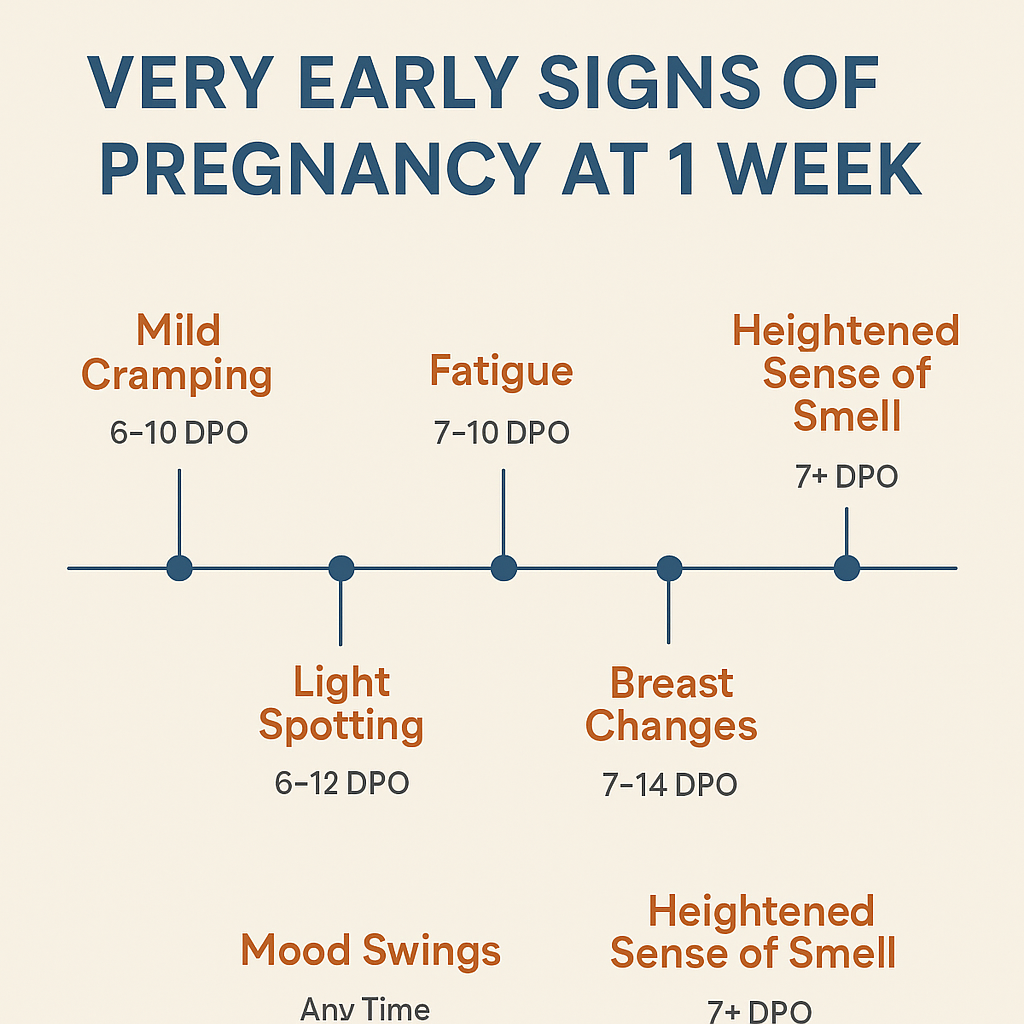You’re barely a week into your pregnancy — or are you? At this stage, most women don’t even realize they’re pregnant, but your body may already be giving you subtle hints. If you’re trying to conceive, recognizing these very early signs of pregnancy at 1 week can help you feel more in tune with your body.
📌 Related: Pregnancy Week 1 – The Journey Begins
In this article, we’ll explore:
- What’s happening in your body during week 1
- Subtle physical and emotional signs
- How early pregnancy symptoms differ from PMS
- What science says about detection
- What to do if you suspect you’re pregnant
🧬 What Does “1 Week Pregnant” Actually Mean?
Medically, week 1 of pregnancy begins on the first day of your last menstrual period (LMP) — even though you haven’t conceived yet. Fertilization usually occurs around week 2 of your cycle, during ovulation.
Still, women who are trying to conceive often refer to “1 week pregnant” as the days just after conception or around ovulation, when implantation may be starting.
🧠 So this article refers to the very early post-conception stage, roughly 6 to 10 days after ovulation.
⚠️ Can You Feel Pregnancy Symptoms at 1 Week?
Some women swear they “just knew” they were pregnant right after conception — but is that possible?
While most pregnancy symptoms take time to appear (usually around 4–6 weeks), some very early signs may start before a missed period, often linked to hormonal shifts from implantation and rising hCG.
🔍 Very Early Signs of Pregnancy at 1 Week
1. Mild Cramping or Implantation Pain
You may feel mild twinges or pulling sensations in your lower abdomen. This is sometimes caused by implantation, when the fertilized egg attaches to the uterus.
- Typically felt 6–10 days after ovulation
- Often mistaken for PMS
🧠 Learn more: Pregnancy Cramping: What’s Normal vs. When to Worry
2. Light Spotting (Implantation Bleeding)
About 25–30% of women experience light spotting or pink discharge a few days before their period is due.
- Lighter and shorter than a regular period
- Usually occurs 6–12 days post-ovulation
- Not accompanied by clots or heavy flow
3. Fatigue and Low Energy
Feeling unusually tired is one of the earliest pregnancy signs. It’s caused by a spike in progesterone, which can:
- Lower your blood pressure
- Increase body temperature
- Disrupt sleep
4. Tender or Swollen Breasts
Hormonal changes can cause your breasts to:
- Feel fuller or sore
- Have tingling sensations
- Show more visible veins
This can occur even before your period is due.
5. Heightened Sense of Smell
Some women report smelling things more intensely than usual — from food to perfume to body odors. This could be due to hormonal changes affecting the olfactory system.
6. Mood Swings or Emotional Sensitivity
Even if you’re not expecting it, your emotions might be on edge:
- Crying more easily
- Feeling irrationally frustrated
- Heightened emotional reactions
7. Bloating or Digestive Changes
Rising progesterone can slow down digestion, causing:
- Bloating
- Mild constipation
- Slight increase in gas
Sound familiar? These can mimic PMS — but may also be your first pregnancy clues.
🧪 Can You Take a Pregnancy Test at 1 Week?
Most home pregnancy tests detect hCG starting about 10–14 days after ovulation.
At 1 week post-ovulation, hCG levels may still be too low to detect, which is why tests are usually more accurate after a missed period.
If you’re eager:
- Try a sensitive early detection test (like First Response)
- Test again in 2–3 days if it’s negative
🤔 Early Pregnancy vs. PMS – Key Differences
| Symptom | PMS | Early Pregnancy |
|---|---|---|
| Cramps | Usually starts later | Earlier, mild twinges |
| Mood swings | Common | More intense in some cases |
| Breast tenderness | Fades before period | Continues or increases |
| Spotting | Rare | Light and short (implantation) |
| Fatigue | Some | More pronounced and early |
🧭 What to Do If You Think You’re Pregnant
If you suspect you’re pregnant based on early signs:
✅ Track your symptoms in a journal or app
✅ Avoid alcohol, smoking, and high caffeine
✅ Start taking prenatal vitamins with folic acid
✅ Get plenty of rest and hydration
✅ Wait to test until your period is due, or later for best accuracy
📌 Related: What to Eat When Trying to Conceive
🧠 Expert Insights
According to the American College of Obstetricians and Gynecologists (ACOG), early pregnancy symptoms vary widely — and many women may not feel anything until several weeks in.
Similarly, the NHS notes that early symptoms often mimic PMS, making them easy to overlook.
📌 Summary: Very Early Signs of Pregnancy at 1 Week

| Symptom | Typical Timing |
|---|---|
| Implantation spotting | 6–10 DPO |
| Mild cramping | 6–12 DPO |
| Fatigue | 7–10 DPO |
| Breast changes | 7–14 DPO |
| Mood changes | Any time after ovulation |
| Heightened sense of smell | 7+ DPO |
📚 Related Articles
- Pregnancy Week 1: The Journey Begins
- Pregnancy Cramping – What’s Normal vs. When to Worry
- What to Eat When Trying to Conceive
- First Trimester Checklist
🤔 FAQs: Very Early Signs of Pregnancy at 1 Week
Technically, you’re not pregnant yet in medical terms — Week 1 starts with your last menstrual period. However, if you’re counting from ovulation or conception, some women report mild symptoms like cramping, fatigue, or breast tenderness around 6–10 days post-ovulation (DPO) due to implantation.
Implantation bleeding is light spotting that occurs 6–12 days after ovulation, when the fertilized egg attaches to the uterine lining. It’s usually pink or brown, much lighter and shorter than a regular period, and doesn’t involve clots.
Early pregnancy and PMS share symptoms like bloating, mood swings, and breast tenderness. However, pregnancy symptoms may start earlier, and some (like spotting or heightened smell) aren’t typical of PMS. Also, breast soreness from PMS usually fades before your period — but persists in early pregnancy.
Yes. Most home pregnancy tests detect hCG around 10–14 days after ovulation. Testing too early may give a false negative. For more accurate results, wait until your missed period or take a sensitive early detection test closer to that time.
Mild cramping and bloating can be caused by rising progesterone levels or implantation. These sensations are normal but may also mimic PMS, making them hard to distinguish in the first week post-conception.
Track symptoms using a fertility or pregnancy app, avoid alcohol and smoking, and start taking prenatal vitamins with folic acid. Stay hydrated, rest, and consider testing around the time your period is due for confirmation.
👶 Final Thoughts
At 1 week, you may feel nothing at all — or your body might whisper subtle changes. Every pregnancy is different. Whether you’re closely watching your cycle or casually curious, learning to tune into early signs empowers you on your conception journey.
Still waiting for confirmation? Be gentle with yourself and trust your intuition — you know your body best.

Leave a Comment